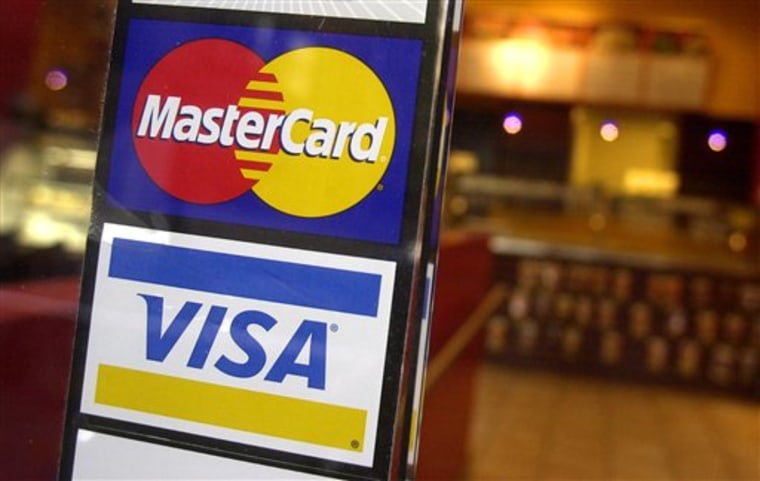How much would you pay to keep your credit card?
For Randy Dawson, a new $29 annual fee pushes the limit. But he'll likely pay it to keep the Bank of America card he's had for five years.
"I feel as though they're holding me hostage over my credit score," said Dawson, a 46-year-old resident of Johns Creek, Ga. who owns a marketing firm.
The problem is that closing an account comes with repercussions, since the average length of your credit history and the total amount of your available credit factor into your credit score.
Annual fees for credit cards are a rarity today, but more cardholders may soon have to decide between paying them or forfeiting their cards. Bank of America this week said it's "testing" annual fees of $29 to $99 on select customers starting next year. Customers were chosen based on "risk and profitability," but the company declined to explain how it decided who was charged $29, versus $99, or anything in between.
Citigroup also notified a "small number" of customers in August that they'd be charged new annual fees. But spokesman Samuel Wang declined to give any further specifics.
Analysts say the moves are a harbinger of things to come.
"They're trying to understand what the market will bear in terms of annual fees," said Ben Woolsey, director of consumer research for CreditCards.com. "They're seeing what level (the customers) will endure without going away."
The experiment by Bank of America comes as the credit card industry searches for ways to make up the revenue it stands to lose as a result of new regulations. As part of the sweeping new reforms that go into effect in February, banks will be limited in how and when they can hike interest rates and fees.
That has left banks examining their books for accounts that aren't very profitable. For example, cardholders who never carry a balance — and never pay late fees or financing costs. Such customers went unmolested for years as banks reaped profits from those who weren't as vigilant paying bills. But in the past year, even customers in good standing have seen interest rates hiked and credit limits lowered. Now, some are among those being slapped with an annual fee.
Bank of America said it hasn't yet made any decisions about applying the fees more broadly. Yet how customers react to its test will no doubt play a role in any changes.
There are of course credit cards that already charge annual fees, including rewards cards tied to specific airlines or hotels. Subprime credit cards, marketed to those with poor credit, also come with a list of eye-popping fees. But for most credit cards, including general purpose rewards cards that use point systems, annual fees have become an alien concept to many consumers.
It's why notice of the new $29 annual fee came as a shock to Pamela Jones-Tintle, who never carried a balance on the card she's had for 18 years. She's leaning toward closing the account, but worries about the consequences.
"My top concern is my credit score," said Jones-Tintle, a 39-year-old resident of Pomona, Calif., who works as an administrator at Cal State Fullerton.
It's also a quandary for Dawson, the Georgia resident who also got notice of the fee. Not only can closing an account lower your credit score, but opening a new one can too since it indicates you're in the market for new credit.
"To get a new card and cancel this one would be a double strike," Dawson said. In turn, a lower credit score could mean the mortgage refinancing he's contemplating could cost him more.
Still, Dawson has his limits. If the fee were more than $50, he'd walk.
That appears to be the line in the sand Bank of America is trying to identify. Just how much are consumers willing to pay for their credit cards? At what point do they walk away? Is the threshold higher if the card is at least five years old?
Before the credit card reforms were passed by Congress and signed by President Barack Obama, the banking industry had warned the law could result in the return of annual fees.
Chase says it doesn't have any similar plans to test annual fees, and Wells Fargo declined to speculate on future practices.
But Greg McBride, a senior analyst with Bankrate.com, says other issuers are likely to start charging annual fees too. He noted that the fees might be applied selectively to the accounts that don't generate revenue, to avoid alienating the more profitable customers.
The American Bankers Association, a trade group based in Washington, D.C., hasn't yet recorded any data to show annual fees are making a comeback, according to Carol Kaplan, a spokeswoman for the trade group. The group says the vast majority of cards currently in circulation don't carry annual fees.
For now, Bank of America says the fees are being assessed on less than 1 percent of its credit card customers, but declined to give specifics.
There were about 80 million Bank of America credit cards in circulation last year, according to CreditCards.com; 1 percent of that is 800,000. Even half that figure provides a large enough sample size to make anyone conducting a scientific study envious.
"If (the test) proves successful, it could become the norm," said Woolsey of CreditCards.com. "It's somewhat up to consumer reaction."
